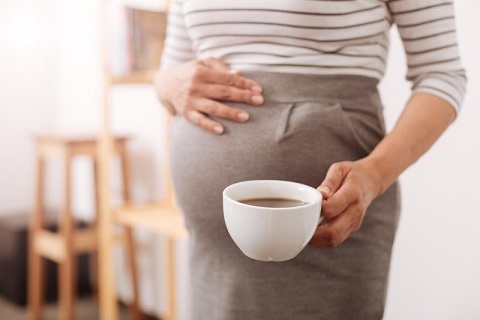Coffee during pregnancy : instead of quitting it, measure it.

During pregnancy, the mother-to-be usually begins an unprecedented process of changing her everyday life. One of the most important changes in a pregnant woman's everyday life has to do with her eating habits, usually by adding more nutritious foods and avoiding specific dishes and substances. During the past few years, experts have pointed out that pregnant women are not obliged to completely deprive themselves of a favorite daily enjoyment, coffee, but instead simply to measure it.

Measuring coffee consumption is needed in order to limit the intake of coffee’s active substance, caffeine. Caffeine is a natural stimulant that can increase the pregnant woman’s heartbeat and blood pressure, while it is confirmed that it can pass through the placenta to the fetus, causing it to become over-excited in increased doses. The key to safe coffee consumption during pregnancy (but also during lactation and breastfeeding) is limiting caffeine consumption.
Although generally acceptable caffeine intake during pregnancy reaches 300mg per day, most doctors recommend that the consumption must not exceed, ideally, 200mg, which translates into a cup of filter coffee per day. Of course, there are types of coffee with even lower caffeine levels, such as Greek Coffee or Espresso (40mg of caffeine per serving), while there is of course the choice of decaffeinated beverages whose caffeine content does not exceed 2-3 mg per portion.
One point that requires attention is the identification of foods containing caffeine. While the active substance is primarily associated with coffee, there are plenty of other foods that contain caffeine in large quantities, such as green and black tea, cola beverages and chocolate. For a pregnant woman who has decided to continue enjoying coffee during pregnancy, it is important not to combine her daily coffee with foods that are high in caffeine, in a way that the daily intake of caffeine would not exceed the suggested dose. A study of the relevant indicators can be surprising to many, as a strong black tea may contain more caffeine than a light Greek coffee – let alone decaffeinated beverages.
One should not forget that every woman and every pregnancy are different from each other. Despite the general rules that do not prohibit coffee during pregnancy, the treating gynecologist is the one who will have the last word, as he is the only one responsible to judge whether there is a further need to reducing coffee consumption.
Pregnancy is one of the most peculiar periods in each woman's life and, in addition to the care and responsibility required, it should not be linked to unreasonable and strict bans, which will ultimately have a negative impact on the woman’s daily mood. Coffee is for most of us a relaxing habit, essential in one’s daily routine – and the same also counts for the mothers-to-be.
Can I drink coffee during lactation?
Naturally, restrictions on caffeine consumption also exist during breastfeeding. The infant (especially infants less than three months of age) is not able to metabolize caffeine like the an adult, so the side effects of caffeine received through breast milk are multiplied. A mother who consumes coffee during the breastfeeding period should carefully observe her baby's behavior in order to discern signs of overstimulation or insomnia that will reveal that something is wrong. Also, it is good to know that high intake of caffeine during lactation has been implicated in medical studies on reduced iron intake by infants.
As with pregnancy, so during breastfeeding, caffeine intake is not excreted, but should be kept at the low levels described above. Drinking coffee immediately after breastfeeding the baby, helps a mother to reduce the intake of caffeine (since a large amount will have been metabolized until the next breastfeeding), while caution is needed in combining foods that will burden the body with caffeine (tea, chocolate, cola refreshments).










